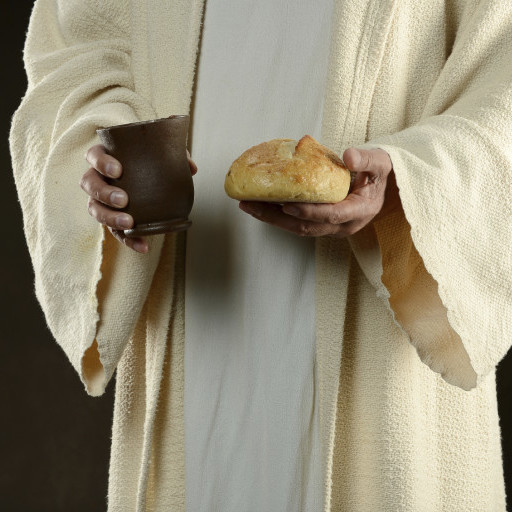Always the prophet, Jesus not only foretold his death on the Cross and suffering both body and soul, he also prophesied how we would remember him after his death, through the emblems of the Lord’s supper, the bread and wine.
In the Bread of Life Sermon, Jesus said that
And Jesus said unto them, I am the bread of life: he that cometh to me shall never hunger; and he that believeth on me shall never thirst.[i]
Except ye eat the flesh of the Son of man, and drink his blood, ye have no life in you.
Whoso eateth my flesh, and drinketh my blood, hath eternal life; and I will raise him up at the last day.[ii]
When they didn’t understand the spiritual nature of what he was saying, he brought his Heavenly Father into the picture and showed how he lived by the living Father who sent him. Going even further, and foreshadowing his High Priestly prayer in John 17, he said those who would partake of the Lord’s Supper would dwell in him and he in them and would live by him.
He that eateth my flesh, and drinketh my blood, dwelleth in me, and I in him.
As the living Father hath sent me, and I live by the Father: so he that eateth me, even he shall live by me.[iii]
When the followers of Jesus who numbered in the thousands (feeding 5,000 and 4,000) heard these sayings, they refused to believe him or perhaps refused to make the whole life commitment to follow him always and become like him by partaking symbolically of his divine nature through the Lord’s Supper, his flesh and blood.
As is often the case in Jesus ministry, they pretended not to know the spiritual meaning of his sayings[iv], and provoked him by saying:
When Jesus knew in himself that his disciples murmured at it, he said unto them, Doth this offend you?….[v]
From that time many of his disciples went back, and walked no more with him.[vi]
Jesus seeing that they were feigning ignorance to oppose him, stated plainly:
It is the spirit that quickeneth; the flesh profiteth nothing: the words that I speak unto you, they are spirit, and they are life.[vii]
Being Jews, who spent a lot of time with analyzing the scriptures symbolically, they understood that he was talking in spiritual prophetic language of being the Son of the Father, the promised Messiah, whose teachings and commandments they would have to live if they believed in Him. They were unwilling to undergo persecution by the leaders of the synagogue whose threatening words would soon have even larger consequences than shrinking Christ’s loyal band of followers.
As the crowd of would be disciples left him, Jesus saw the future large scale desertion and turned to his 12 apostles and asked,
Then said Jesus unto the twelve, Will ye also go away?[viii]
But they were reassuring and amazingly bold:
Then Simon Peter answered him, Lord, to whom shall we go? thou hast the words of eternal life.[ix]
So too must we be bold and reject the criticism of the world and partake of the divine nature of the Savior of the World, even Jesus Christ and come unto through the ordinances of the gospel of Jesus Christ such as the Lord’s Supper, the Sacrament.[x]
[i] John 6:35 https://www.lds.org/scriptures/nt/john/6?lang=eng
[ii] John 6:53-54
[iii] John 6:56-57
[iv] See Nicodemus pretending not to know Christ was speaking symbolically about conversion and spiritual rebirth in order to get more teaching from him: John 3:1-13 “Nicodemus saith unto him, How can a man be born when he is old? can he enter the second time into his mother’s womb, and be born?” Another evidence of pretending not to know the symbolism is the Sanhedrin putting Christ on trial for threatening to destroy the temple and rebuild it in 3 days. Then after his crucifixion we see the same leaders worrying that he might rise from the dead after 3 days according to his symbolic prophecy and asking Pilate to put guards on the tomb.
[v] John 6:61
[vi] John 6:66
[vii] John 6:63
[viii] John 6:67
[ix] John 6:68
[x] See Hebrews 4:16 Let us therefore come boldly unto the throne of grace, that we may obtain mercy, and find grace to help in time of need.
